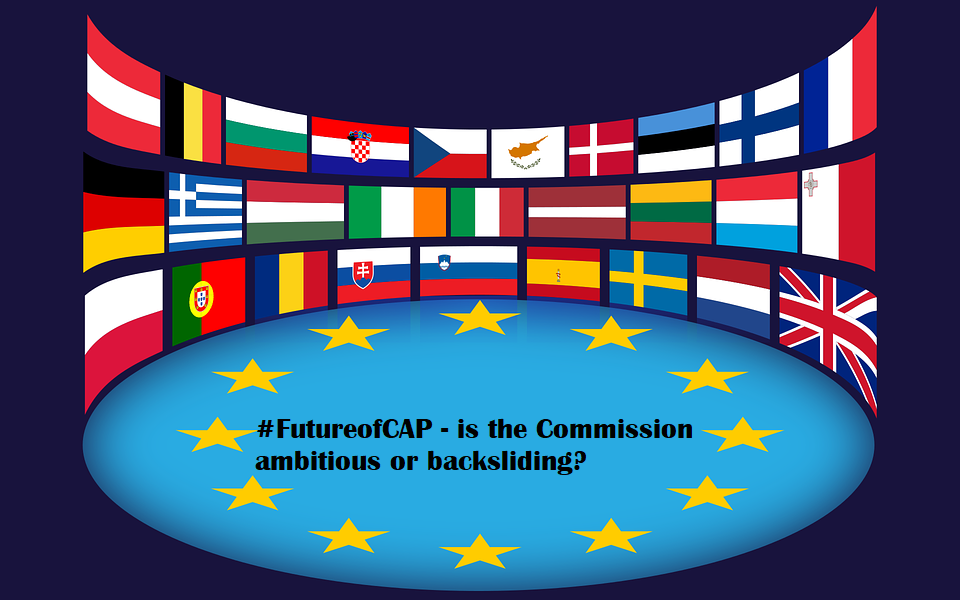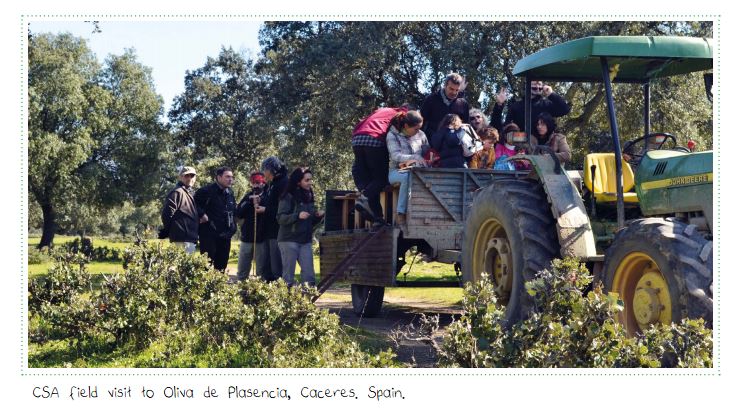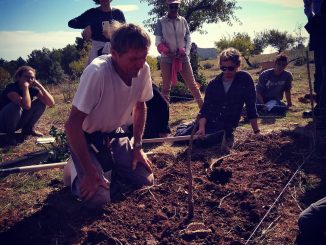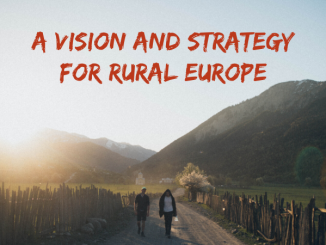 Here we round up some recent perspectives on the Commission’s CAP proposal. This includes a summary of the 18 months of work that went into the document(s); concern over capping backsliding; a briefing on conditionality; which member states want to keep the cash as it was, and an Urgenci (CSA) and Birdlife perspective.
Here we round up some recent perspectives on the Commission’s CAP proposal. This includes a summary of the 18 months of work that went into the document(s); concern over capping backsliding; a briefing on conditionality; which member states want to keep the cash as it was, and an Urgenci (CSA) and Birdlife perspective.
Back to the Future (of CAP)
Tassos Haniotis is Director of Strategy, Simplification and Policy Analysis at the European Commission’s Directorate-General for Agriculture and Rural Development. As such, he has been deeply involved in the process of building the Commission’s proposal thus far. Here he summarises the last 18 months of work on #FutureofCAP in one handy post.
In this, he emphasises the Impact Assessment (AI) that helped put a structure on the legislative proposal. (Full legislative proposals are here: CAP Strategic Plan 2018 EN)) .
In his own words: “After a lot of internal and external analysis, and a wide public consultation, in preparing the Future CAP we came to the conclusion that that the three top challenges the CAP will have to address are its targeting, its environmental and climate ambition, and the joint challenge of its simplification with modernisation.”
These three overarching imperatives are what lead to what he calls the shift “from compliance to performance” which enabled a shift in financial supports towards smaller farms, he claims. He adds that this will not negatively impact overall farm income to the extent some have predicted, because “models tend to over-estimate negative income impacts.” Also suggested is the idea that the mix of mandatory and voluntary measures, and the mix between EU, national and farm level will get the balance right – that’s the balance between an overall, achievable big picture climate and environment targets and a more results-orientated, bespoke and apt targeting for the meso (state) and micro (farm) levels.
Backsliding already
Not everyone is convinced the the upcoming CAP period will reflect these aims or ambitions however. Greens/EFA MEP Martin Hausling points out that “we already see lowering of ambition by the Commission on compulsory capping at 100 000 from 60 000 Euro, knowing that Member States will try to water the proposal down further.”
Without greening, what was called cross-compliance [that’s Statutory Management Requirements (SMRs) & Good agricultural and environmental conditions (GAECs)] – and is now to be called “conditionality” will be even more important, he notes: “We need strong conditionality so that CAP at least does no harm environmentally and socially, ensuring full sustainability, and at best delivers positive outcomes and increases resilience. A lack of obligations at EU level will create weak measures in the Member States with too much scope for backsliding and low ambition. For example, if the German government already stated in their coalition agreement that climate goals will not be met, we would be foolish to believe that Member States will keep the target of 40% greenhouse gas reductions. Furthermore, there is no financial commitment to sustainable measures like those that we had with the Greening measures.”
As a faint shimmer of light, one of the few positive things Trees Robijns of Birdlife Europe has to say about the new CAP proposals relates to conditionality: “There is a partially improved conditionality (old cross compliance and greening) which now includes (part of) the Sustainable Use and Water Framework Directives as well as clarifying and adding some elements to the Good Agricultural and Environmental Conditions (appropriate protection of wetland and peatland).”
There is however a however: “However the flexibilities in implementation will need to be monitored closely and it does not apply to crucial parts of the policy such as investment aid.”
Conditionality
As a quick aside, we hear a lot about cross-compliance, but little about what’s actually involved. So, here’s a link to explain and an image that lists all the elements. Clearly, much of cross-compliance is just the basic rules for farming, and, as Alan Matthews showed in 2014, there is some logic in localising and nuancing the implementation and interpretation.
If however this is what is to replace something as significant as greening, it will need considerable strengthening.
Some countries want to to keep the budget as is
Matthews has also recently pointed out that “agricultural Ministers from six Member States – FR, ES, IE, PT, FI and EL – met in Madrid recently to formulate a declaration calling for the CAP budget to be maintained at its current level. This declaration – which is open to agricultural Ministers from other Member States to support – will be presented and discussed at the next AGRIFISH Council on June 18-19.”
While this is to be expected, the involvement of France is noteworthy – Matthews points out that “France transferred funds from Pillar 1 to Pillar 2 in the current MFF period. If indeed this is where France wants to spend more money, it can do this by increasing its national spending on rural development interventions more cheaply than by seeking an increase in the CAP budget for this purpose. For these reasons, why France wants to go to the barricades to call for an increase in the CAP budget is hard to understand.”
Then again, as our own Samuel Feret made clear some weeks back, there is a lot going on with the modernising Macron government, which meanders between rupture and routine regularly.
Positions
In recent weeks, a number of perspectives have emerged on what CAP does or should do.
An Urgenci for CSA support
Here’s the CSA – Community Supported Agriculture – movement’s position, as represented by Urgenci. Taking a stance somewhat similar to that brought forward by the #EU3F IPES Food event, the network states “the time has now come to create a New Common Food and Agriculture Policy in Europe”. Three specific areas are put forward.
Promote Food Democracy
Integrate civil society organisations in the decision making spaces for public agriculture and food policies, at all levels of the decision-making process
Support the creation of Local Food Policy Councils that can serve as development laboratories for agricultural and food projects in specific regions.
Support a farming model that meets today’s social needs
There is an urgent need for support of networks of solidarity-based partnerships in agroecology.
Direct support for diversified farms that are committed to local and solidarity-based partnerships between producers and consumers…This could consist of linking some financial support from the CAP to the practice of direct sales or short supply chains.
Develop agricultural research that values and supports citizens’ commitment and farmers’ knowledge
There is a need for stronger support for participatory research programmes involving farmers and committed consumers through EU structural funds.
Click on the button to load the content from urgenci.net.
FutureofCAP – even worse for biodiversity & climate than current CAP
Trees Robijns and Ariel Brunner of Birdlife Europe found little to commend in the CAP proposals, when blogging with on CAPreform.eu. Here’s a summary of just some (!) of their issues:
We do not have sufficient funding to protect nature, with cuts to dedicated environmental cash and to ringfencing (e.g. from mandatory greening to voluntary eco-scheme).
Climate spending will not be real money spent on measures for climate.
(So there is more money for this officially, but in reality, this will be vague and for a continuation of standard practice…”even direct payments to intensive livestock operation or to arable farming on peatland will still be automatically considered as climate expenditure.”)
The new programming structure, although good in its intention, risks becoming a Member State free-for-all.
The new objectives and indicators are not specific enough.
The old system (of pillars and limited modulation) remain strongly in place.
Capping will probably be ineffective.
Involvement of environmental authorities remains weak.
It seems then, that the positivity of our opening contributor Tassos Haniotis isn’t shared – by anyone.
More CAP news on ARC2020
More CAP news elsewhere
This interview with an organic farmer and Green/EFA MEP Thomas Waitz is a very handy introduction to the CAP.
Click on the button to load the content from www.greeneuropeanjournal.eu.
https://metamag.org/2018/06/06/race-to-the-bottom-on-environmental-farm-standards-looms/







2 Trackbacks / Pingbacks
Comments are closed.